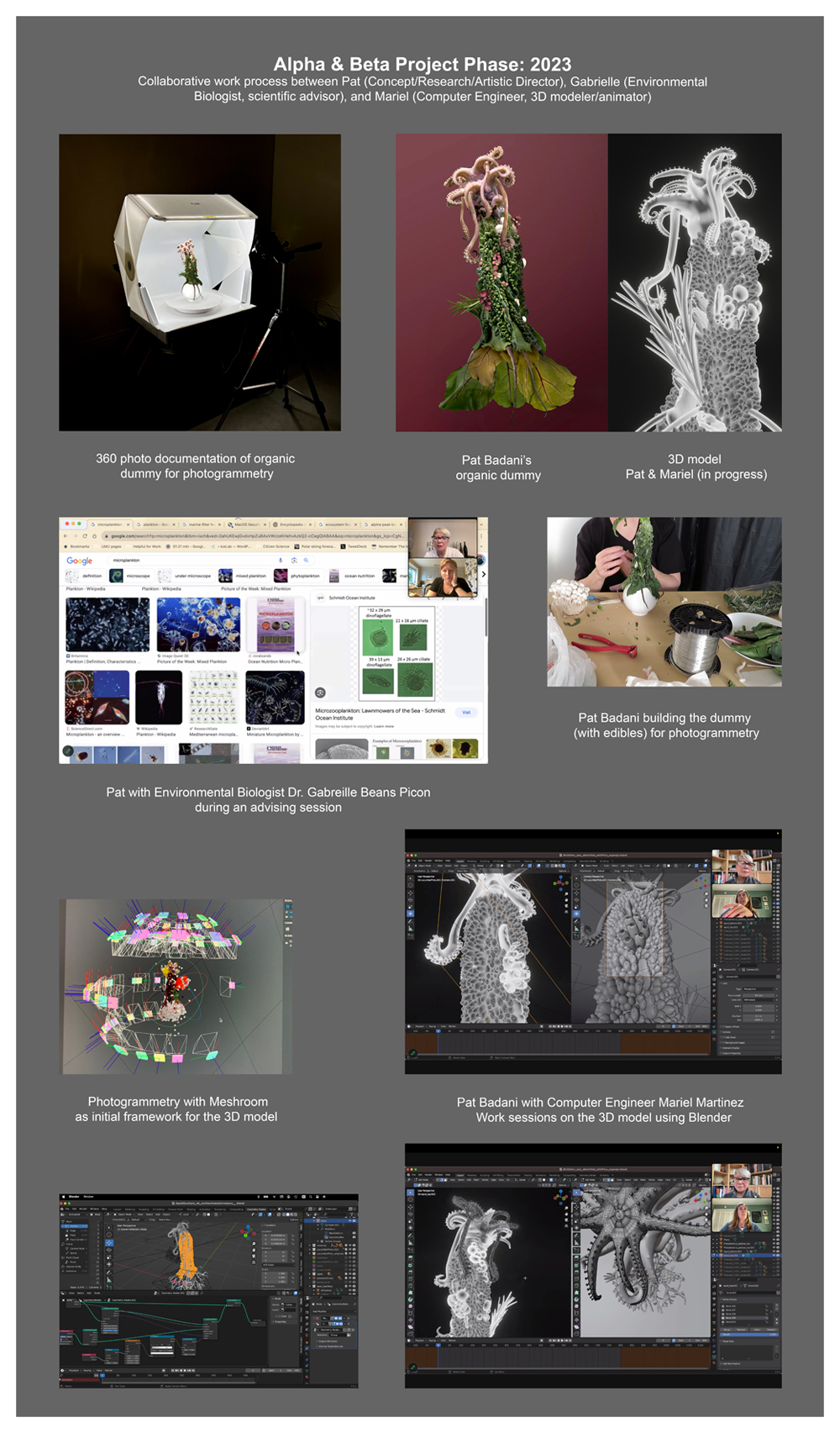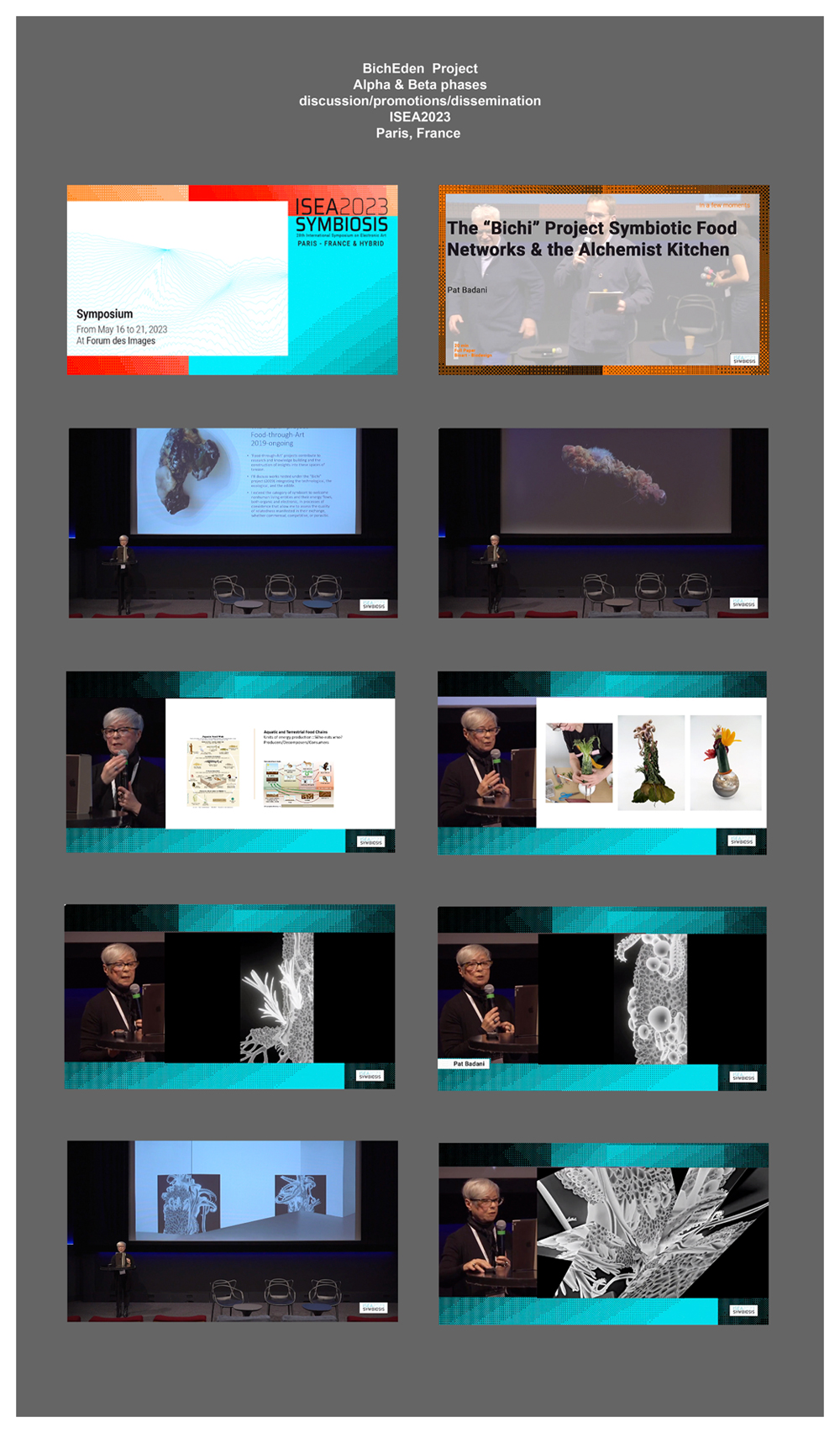BichEden
(2023) 3D Animations – Video/Audio – Multichannel video installation (in progress)
-Pat Badani: Artistic Direction, Research, Conceptual Design, Sculpture, Photography, Video and Audio Design.
-Mariel Martinez, computer engineer: 3D modeler, technology advisor.
-Gabrielle Beans, biologist: scientific advisor.
The project is supported by two 2024 awards; a Fellowship at Harvestworks Digital Media Center (New York), and a major Canada Council for the Arts – Media Arts Research Creation/Concept to Realization Grant.
Keywords:
Ecosystems, food and ecology, food and health, food chains, energy flows, creative visualizations, speculative fictions, research-creation.
ABOUT THE PROJECT – IN PROGRESS 2022 - 2024
BichEden is a multichannel video installation of technologically re-engineered 'still life' artifacts characterizing endangered species in Coral Reef, Rain Forest, and Alpine ecologies. Ecological Extinction Studies and scientific concepts related to food web communities provide empirical grounding for associative thinking in the creation of imaginative 3D animations - an uncanny archaeology of artifacts that forward awareness on the fragility of ecosystems in the face of climate change.
'BichEden: Oceanic Banquet' (2023) characterizes endangered species in Coral Reef ecologies. It is the first animation in the BichEden triptych destined for a multichannel video installation to be completed in 2024.
'BichEden' explores how media art can raise awareness and engage audiences about the ongoing crisis of climate change. Three critical ecosystems—coral reefs, rainforests, and alpine regions—are facing alarming declines in flora and fauna. Featuring specific endangered species in these 3 ecologies, the 'BichEden' triptych will be shown as a multi-channel video installation with three distinct videos interwoven on separate displays, creating an immersive visual experience. The synchronized play of these independent videos will enhance the overall impact, allowing for a nuanced storytelling approach and a rich, multidimensional experience. The project highlights the beauty and uniqueness of these endangered species, integrates elements of hope and resilience, and emphasizes what stands to be lost by their disappearance. The project fosters empathy and concern, instigating a sense of collective responsibility regarding climate change.
'BichEden' imagines potential hybrid life where fusion and remixing are the result of symbiotic, ecological thinking, resulting in a curious archaeology of artifacts that act as a record or a future-oriented worldmaking. Content is based on an investigation into how organisms relate to each other in three ecologies: coral reefs, rainforests, and alpine regions: how life occurs in predator/prey relationships (who eats who?), how biological systems are disrupted by climate change, and how repercussions of biological extinction emerge within each food chain. Food chains describe the feeding relationship of organisms in an ecosystem - animals, fish, plants, and fungi – and the sequence that emerges when one organism eats another to survive. Climate change is a major cause of biotic diminishment. Endangering organisms in these food chains increases the probability of ecosystem collapse as organisms die of starvation (in fact, extinct or endangered organisms disrupt food chains to the degree in which humans are seen as future endangered species, too). Biological extinction is indeed a problem because humans rely on biological entities for food, water, energy, medications, and to regulate climate and diseases. One example I explore in 'BichEden: Oceanic Feast' (see work sample) is the contribution of climate change on declining coral reefs. Rising sea temperatures lead to coral bleaching, expelling the algae living within, causing coral to turn white and weaken. This disrupts the delicate balance of the reef, affecting fish, crustaceans and mollusks that depend on the coral for shelter and food.
As reference to build the 3D sculptures I cull information and images on endangered plants and other organisms through 'Red Lists'. The 'Encyclopedia of Endangered Life' and other online red lists have become the world's most comprehensive sources on global conservation. These lists exemplify data as humanity’s principal means of understanding nature through new technologies, allowing us to collect, analyze, and interpret vast amounts of information. However, I find this empirical approach overlooks nuances, contextual information, and the intricacies of natural systems, ultimately leading to an incomplete understanding. My aim with 'BichEden' is to balance quantitative data (which I use to research and source visuals for the project) with qualitative insights (and imaginative speculations). I collect, select, re-mix, subvert, and transform these Red List visual documents which are then 'queered up' and re-engineered digitally with Mariel Martinez, re-imagining the organism's relationship to each other and to their environment, resulting in a totally fictional, ‘virtual’ 3D model -- a hybrid, biomorphic assemblage that embodies difference and strangeness, merging multiple narratives in which fact and fiction intersect. Red Lists on endangered organisms and 'BichEden’s' extinction narratives are seen as complementary and open-ended cultural forms that transform creative practices, revealing and concealing the most fundamental acts of human invention. Like organisms in a symbiotic relationship, I see database and visual narrative as existing in a mutually beneficial relationship, culminating in a more holistic and emotive comprehension of complex ecological and biological phenomena.


(Left image) Documents showing the 'making of' BichEden: Pat Badani in collaboration with Dr. Gabrielle Beans (Scientific Advisor) and with Mariel Martinez (Computer Engineer).
(Right image) Pat Badani delivering a lecture about the project during 'Symbiosis' @ ISEA2023 symposium and exhibition held in Paris (May 2023). Badani’s paper is published in ISEA’23 proceedings: 'The Bichi project: Symbiotic Food Networks & The Alchemist Kitchen.'